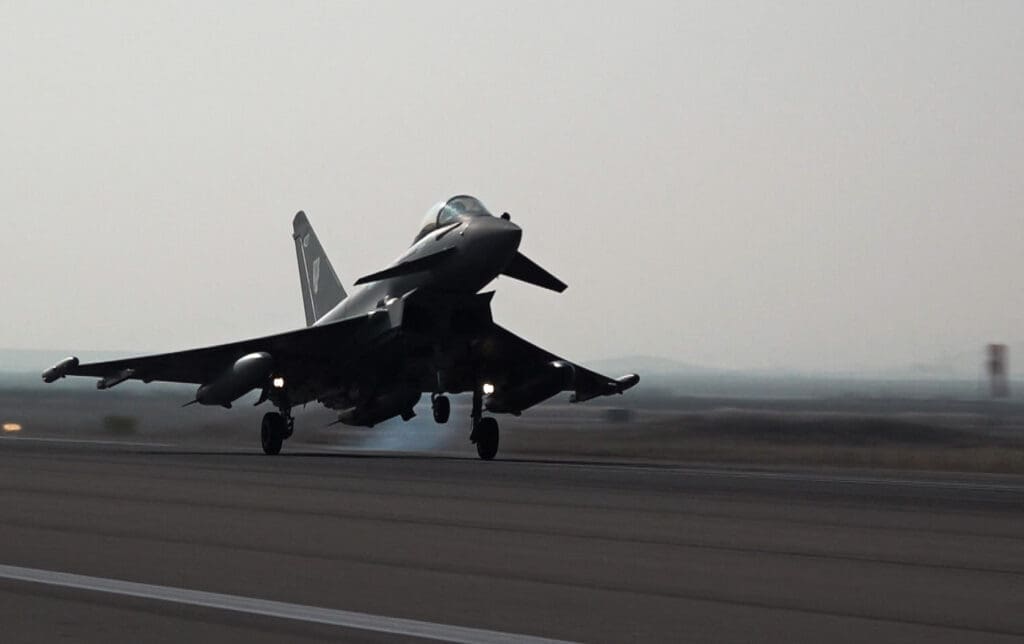As the United States’ long-standing commitment to European security erodes under the Trump administration, the bloc’s defense partnership with Türkiye hit a new milestone in March, when a consortium of Europe’s leading arms companies submitted a formal bid to sell Ankara 40 Eurofighter Typhoon jets.
The fighters have seen active service in the air forces of several states in the Middle East, including Saudi Arabia, Kuwait, Qatar and Oman. The Turkish purchase, from a consortium representing the United Kingdom, Germany, Italy and Spain, would solidify the emerging defense industry partnership between Europe and Türkiye.
The U.S. had removed Türkiye from the F-35 joint strike fighter program in July 2019 after Ankara’s decision to buy S-400 air defense systems from Russia. This frustrated Türkiye’s efforts to modernize its air force. As an interim solution, it opted to acquire an additional 40 F-16 fighter jets and modernization kits from the U.S.—yet these were not forthcoming either. In response, Türkiye set out to explore alternatives.
In November 2023, it emerged that the Turkish government had initiated talks with European states with a view to procuring 40 Eurofighters, reflecting its assessment that they represented the most viable alternative to American systems. Turkish Minister of Defense Yaşar Güler remarked in a televised interview a month later that “the Eurofighter is a very good alternative, and we want to buy it.” Germany’s lifting of its objections in late 2024 expedited the process, resulting in a formal offer last month that is now under evaluation by the Turkish government.
At the moment, the F-16 remains the keystone of Türkiye’s air capabilities, which are rapidly aging. Unless Ankara swiftly procures more advanced aircraft, its air force risks becoming irrelevant. This widening capability gap could be addressed, at least in the medium term, by the procurement of Eurofighter Typhoons, which are multirole and able to carry a broad range of air-to-air and air-to-surface weapons. They have also proven their capabilities in complex, multi-domain combat scenarios and could operate within a mixed Turkish air fleet.
Dependency and Its Discontents
Donald Trump’s second presidency has a somewhat paradoxical foreign policy orientation, comprising aspects of both isolationism and expansionism. This has ushered in the most contentious period in the history of the trans-Atlantic partnership. For many in the Trump administration, American commitments to the security and defense of Europe are a dispensable burden. The credibility of those guarantees is also undermined by annexationist rhetoric against Canada and Denmark, both fellow members of NATO, while Washington’s volte-face towards Russia’s aggression in Ukraine has also damaged European perceptions of the U.S. as a principled and steadfast ally.
Regardless of whether the partnership can be fixed, European actors are coming to the realization that the power asymmetry creates an unsustainable European security dependence on the U.S.—a situation they are now moving to address.
To do so, European actors, primarily the EU, are promoting their indigenous defense industry infrastructure. Some states on the continent are also reconsidering their defense industry collaboration with the U.S., especially regarding F-35 fighter jets. The prime minister of Canada, another NATO member, recently remarked that his country, too, “is looking for possible alternatives to its deal to buy U.S. fighter jets, in part because it relies too much on the United States for security.”
Türkiye’s ouster from the F-35 program provides a case study in the risks of such overreliance. Ankara had been an active member of the multinational program for more than a decade before being removed by a unilateral American decision in 2019. A year later, Washington even imposed sanctions on Türkiye’s Presidency of Defense Industries (SSB), the country’s top defense procurement and development body, which have yet to be lifted.
Those moves arguably sent a warning to the other seven members of the program, five of which are European, demonstrating the risks of defense collaboration with powerful parties that can take such unilateral measures. While the Turkish government is seeking to persuade the Trump administration to readmit it to the program, there is practically no guarantee against it being expelled again should the two governments’ strategic preferences clash in the future.
A New Chapter?
The instability sparked by Russia’s aggression, compounded by Trump’s moves, is pushing Europe and Türkiye towards a closer security and defense partnership. Early signs of this can be seen in new strategic dialogue mechanisms and more frequent meetings between European and Turkish military chiefs.
Historically, close collaboration was hindered by the overdependency of both sides on third parties for their procurement needs, and by the absence of a strong and sustained political will to push it forward. Nonetheless, the partnership has already had several successes that could pave the way for more. Turkish Aerospace Industries (TAI), for example, has partnered with European defense companies on a range of projects, including the A400M military transport aircraft and Agusta A129 attack helicopters. Recently, Italy’s leading defense company Leonardo and Turkish firm Baykar, renowned for its Bayraktar drones, announced a joint venture to manufacture unmanned aerial vehicles.
The Eurofighter deal offers various opportunities to both European countries and Türkiye. The emerging consensus in Europe is that security vulnerability can no longer be tolerated and that it is time to create a robust and resilient European defense architecture. Thus, stronger defense industry partnerships have turned from a matter of choice into one of necessity. The aforementioned Eurofighter sales to Gulf states generated closer cooperation between the two sides on security and defense. A similar deal with Türkiye could deliver substantial strategic dividends as well as address Europe’s security risks.
The deal offers even greater opportunities to Türkiye, whose air force has long depended on the U.S. as its only fighter jet supplier. The volatility in their relationship of late has sown serious doubts about this strategy. A more diversified procurement field could improve Türkiye’s resilience against supply shocks, whether caused by supply chain setbacks or political conflicts.
The Eurofighter deal would allow Türkiye to engage the European defense industrial base in a closer, more dynamic and more regular manner. Intensified defense engagement with Europe will likely produce security, economic and strategic benefits, not least of which is access to the state-of-the-art European aerospace technology. It would also mean improved defense industry cooperation with four NATO members in Europe simultaneously.
The global security dynamics put in motion by the vagaries of the Trump administration have prompted both Europe and Türkiye to reconsider their security and defense policies. The potential Eurofighter deal presents them with an opportunity for collaborative capability development and could pave the way towards more institutionalized defense cooperation. It is now up to the Turkish government to decide.


